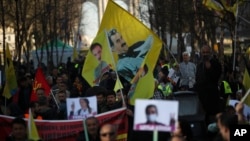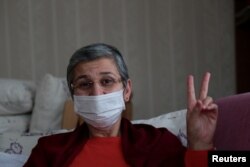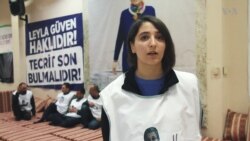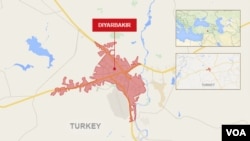An estimated 300 people, including key Kurdish politicians and activists, have joined a widening hunger strike campaign to demand improving jail conditions for Kurdistan Workers’ Party (PKK) leader Abdullah Ocalan.
The hunger strike started when the pro-Kurdish Peoples’ Democratic Party (HDP) lawmaker Leyla Guven said in November in jail that she was abstaining from eating until Turkish authorities agreed to more access to Ocalan.
Ocalan has been locked in a prison on an island near Istanbul since 1999. He has been prevented from meeting his lawyers since 2011 and has rarely been allowed to see his family.
Earlier this week six other Kurdish lawmakers and political activists joined the strike aimed at putting pressure on the Turkish government to respond to their demands.
One of the lawmakers, the HDP Diyarbakir deputy Dersim Dag told VOA that the protest will likely spread in the following days as the predominantly Kurdish southeast nears International Women’s Day on March 8 and the Kurdish New Year on March 21.
“The state should criticize itself and do something accordingly before we hear bad news,” Dag said adding that Guven’s hunger strike has reached a life-threatening stage.
“The nation should become a part of this resistance and expand it to a larger degree,” he added.
Watch: More join hunger strikes for Ocalan
Dag and other five lawmakers and activists announced their strike in a public gathering in Diyarbakir Sunday. The meeting was forcefully ended after the Turkish police raided the place and detained the strikers.
Deteriorating health
Guven, 55, has refused any medical treatment.
The Turkish Medical Association told VOA Guven is suffering from critical health conditions but is taking vitamin B-1 to sustain herself.
“Hunger strikes have very adverse effects on the human body which can also be seen in Ms. Guven’s body,” said Halis Yerlikaya, a member of the Turkish Medical Association’s central council in Diyarbakir.
“First of all, there is a severe weight loss, and due to the prolonged hunger strike, she faces problems such as exhaustion in the body and walking difficulties because of melting in muscles,” Yerlikaya added.
Guven was jailed in January 2018 for publicly opposing Turkey's military offensive in the predominantly Kurdish town of Afrin in northern Syria. On January 25, after 79 days on her hunger strike, Güven was released because of her deteriorating health, pending a trial.
Guven faces more than 100 years of imprisonment on charges of membership and leadership of a terrorist organization, terror propaganda in support of the PKK and inciting hatred. Those charges are denied by her and her party.
“I think these charges are used very arbitrarily, have absolutely nothing to do with the rule of law. The terrorism charges are very broad brush, utilized incredibly by the Turkish government right now. All the charges against all of the members of the parliament from the HDP including our [former] co-chairs Selahattin Demirtas and Figen Yuksekdag are all on their statements, things they have said,” the HDP representative to the United States, Giran Ozcan, told VOA.
Turkish- Kurdish peace process
Ozcan told VOA that Guven believes giving Ocalan access to his lawyers and family members could open a new gateway to resume the Turkish-Kurdish peace process that collapsed in mid-2015.
“Ms. Guven’s demands are that they don’t behave arbitrarily to Mr. Ocalan,” said Ozcan. “A visit from a family member once every couple of years is not an end of this isolation.”
Turkish officials have said the march and hunger strike campaign are an attempt to stirring up trouble and have refused to yield to the strikers’ requests.
"Now, who cares about the head of the terrorist organization,” Turkish interior minister Suleyman Soylu was quoted by news site T24 as saying last month.
“They [HDP members] are trying to go to the home of a so-called former member of the parliament who is on hunger strike for the head of the terrorist organization. They are looking for ways to reignite matters over ethnic backgrounds,” he added.
Turkish President Recep Tayyip Erdogan accuses the HDP of being the political wing of the PKK.
“The HDP is equal to the PKK,” Erdogan said in an interview with TRT television early February. “It’s crystal clear, and their leaders admit as much themselves.”
The PKK is a Kurdish militant and political organization that has been demanding Kurdish autonomy in Turkey since 1978.
Turkey, the United States and European Union have designated the PKK as a terrorist organization.
Violent clashes between Turkey and the PKK have continued for more than 30 years, resulting in the deaths of nearly 40,000 people.








